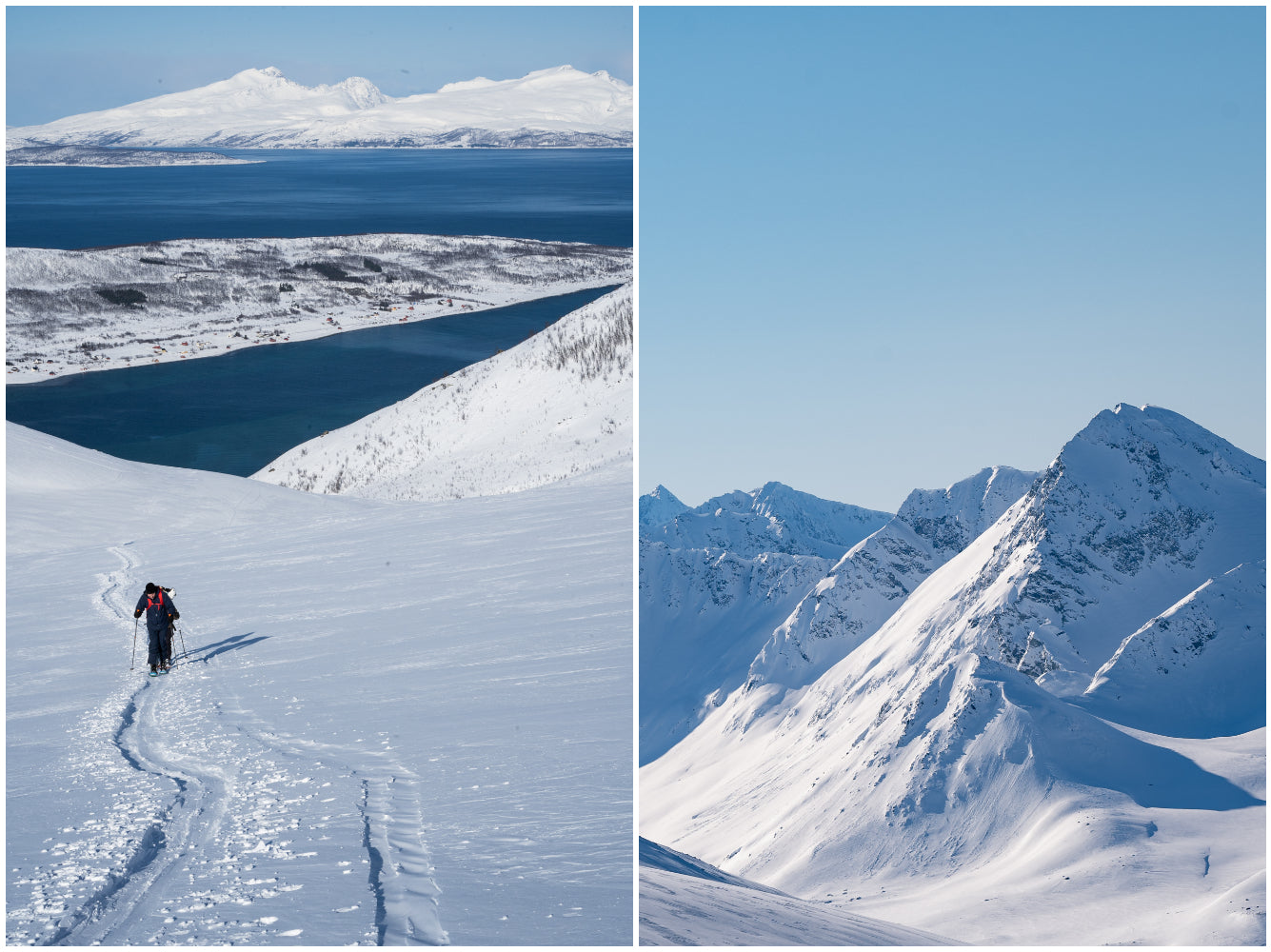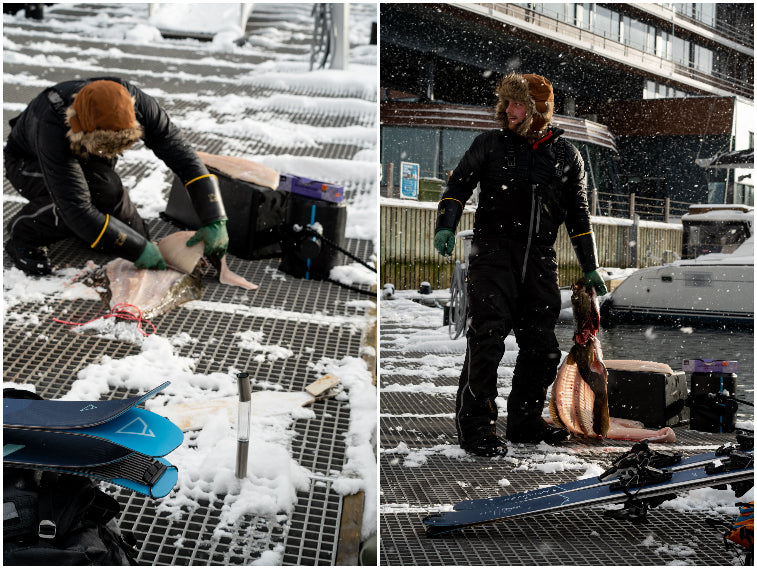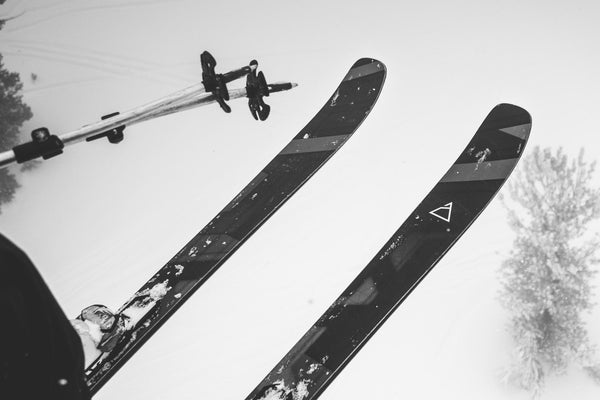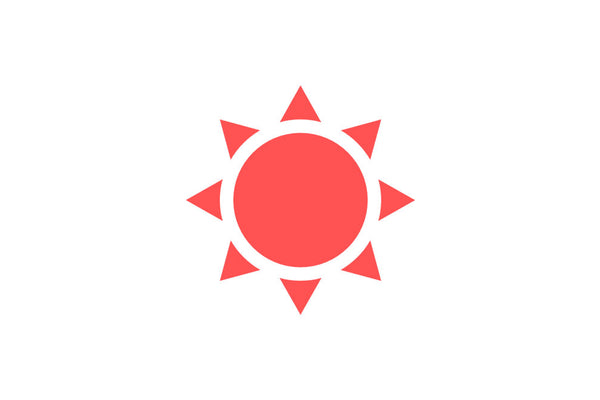What does a ski trip in Northern Scandinavia involve? Swedish athlete Max Ahlberg shares stories of skiing snowy faces that rise out of glassy fjords and fishing for Norway’s revered halibut and reflects on how climate change is making ski conditions more unpredictable.
Waves crash against the hull of the Arctic Eagle as it battles its way across a fjord in Northern Norway in early April 2022. The 48 foot catamaran is aiming for the towering white slopes of Storgalten peak in the Lyngen Alps.
Max Ahlberg futilely seeks sleep on the rocking, wave-battered ship. It’s just the beginning of another ski trip for this Renoun athlete and sustainable engineer.

Born and raised in Sweden, Max grew up skiing but it wasn’t until his mid-teens that he really started to devote himself fully to the sport. “This was around the same time Candide Thovex, JP Auclair, and Jon Olsson were creating more of a freestyle scene and trying out more jumps and stuff like that,” Max explains. After high school, Max worked as a ski instructor in Norway, the Swiss Alps, and New Zealand.
“I got really hooked on skiing, especially freestyle and freeriding,” Max recalls. “There are no rules, no right or wrong and there can be a closer connection to creativity when you combine skiing with photography and film.”
Max initially connected with Renoun in 2015. Cyrus Schenck, Renoun CEO and co-founder, was in Europe to receive the ISPO Gold Award for Innovation in Design and Technology. He passed off Renoun skis to Max and his brother, Peder, who happened to be in the right place at the right time. The same year the Ahlberg brothers field-tested the Renoun skis on a Lofoten trip, snapped some photos, and the rest is history. “It was a little skill and a lot of luck,” Max explains with a grin. Since this initial connection, Max and Peder have even contributed to Renoun’s design development: “the ski design has progressed a lot,” Max emphasizes.

Today Max works for Einride, supporting the development of autonomous EV trucks by focusing on engineering the automated drive system. The goal is to make transportation more environmentally friendly through electrification.
“It’s pretty evident that we as humans have a big impact on the climate,” Max says, “so we have to do something about it.”
In addition to developing more sustainable transport systems with Einride, Max has also made it a personal goal to limit his carbon footprint (which is currently around three tons of CO2 per year) by avoiding air travel and eating more sustainably.
Max’s personal commitment to lower his carbon footprint aligns with Renoun’s commitment to being carbon neutral. “It’s something I value very much and it’s super cool that Renoun has taken that step as a brand, to do something about the environment,” Max explains. “Good skis and a commitment to addressing climate change make it really easy to stand behind Renoun.”
Max planned the early April 2022 trip in Lyngen, Norway, because he could access the mountains without flying, thereby limiting his carbon footprint but still pursuing a big backcountry adventure. Originally aiming to ski in Lofoten, the expedition team pivoted to Lyngen at the last minute because the snowpack in Lofoten simply wasn’t good enough.“After the stormy fjord crossing, we woke up to clear blue skies and the water of the fjord was like a mirror,” Ahlberg recalls with awe. “We knew this may be the one good day of this trip.”


Max and his ski partners – Malin Setterström and Rikard Landrin – had a perfect ski day on Storgalten, which literally translates to “big boar” in Norwegian. Max was skiing a pair of Renoun Citadels.
“The Citadels are my favorites. It’s kind of my dream ski,” Max smiles. “Comparing the Citadels to other skis, it’s by far the most stable and fun ski relative to the weight it has. The light weight of the Citadels means you can do the ski touring you need to do in Lyngen but still have fun on the downhills.”

The group capped off the day with winter swimming (“vinterbad”), a Swedish tradition. “The sun was still shining and it was that magical evening light. Even though it's 4 degrees [Celsius] in the water you just want to jump in again and again; the water is crystal clear and it’s beautiful,” Max describes, his eyes lighting up at the memory.
Amidst the post-storm calm however, snow in the mountains had shifted in response to the recent precipitation and warmer temperatures creating unstable and dangerous avalanche conditions across much of the region. The team didn’t know what the rest of their trip would hold.
The team sailed across another stormy fjord to a small, sparsely populated island where they explored some low grade slopes on the island, keeping well out of hazardous avalanche terrain.
“When we’re planning these trips we just try to stay flexible,” Max explains.

Skiing for Max is more focused on quality over quantity. Given the dangerous conditions, Max, Malin, and Rikard pivoted to enjoying the local culture: drinking beer, chatting with fisherman moored in the harbor, and even trying their hand at fishing as they sailed back to Tromsø.
“I caught a really big fish,” Max says, a mischievous grin spreading across his face as he describes the 45 kg (100 lb.) “hellefisk” he reeled in.
Catching a halibut – dubbed the “holy fish” in Norwegian – is no small feat and confers a sense of respect to the fisherman so Max found himself the recipient of many accolades from Norwegian fishermen eyeing his catch.
“A trip to Northern Norway is not just about skiing, it’s about nature and fishing and fjords, the adventure that comes with unpredictable weather… one shouldn’t go there just to ski.”

Embracing the spirit of adventure, Max and his team capped off their ski trip with a few days in Finland’s Lapland in search of better snow and safer conditions. This leg of the journey included remote skiing, karaoke bars, Northern lights, reindeer kebabs, and bear pizza. “I’d never had that before,” Max chuckles.

Though the trip had certainly not gone as planned, Max was all smiles describing the group’s escapades along the way. But then his face grows serious.
“20-40 years ago, the temperature changes around freezing were small. It stayed below freezing for most of the time which made the snow a little more stable and predictable,” Max explains. “Now with average temperature rising, we’re getting more melting snow and sometimes rain which was not common before. This is creating more dangerous avalanche conditions.”

The sobering reality is that climate change is threatening snowpack across the world. And all skiers are or will soon have to reckon with the loss of snow and more unstable conditions. Max Ahlberg is the athlete to emulate as we all navigate skiing in the face of climate change. His professional and personal commitment to lessening his environmental footprint, his stoke for backyard adventures that minimize impact, his openness to unexpected adventures, and his willingness to adapt are all qualities to learn from. Follow Max on Instagram at @ahlbergmax.


Author Bio
www.annekawilliams.com





